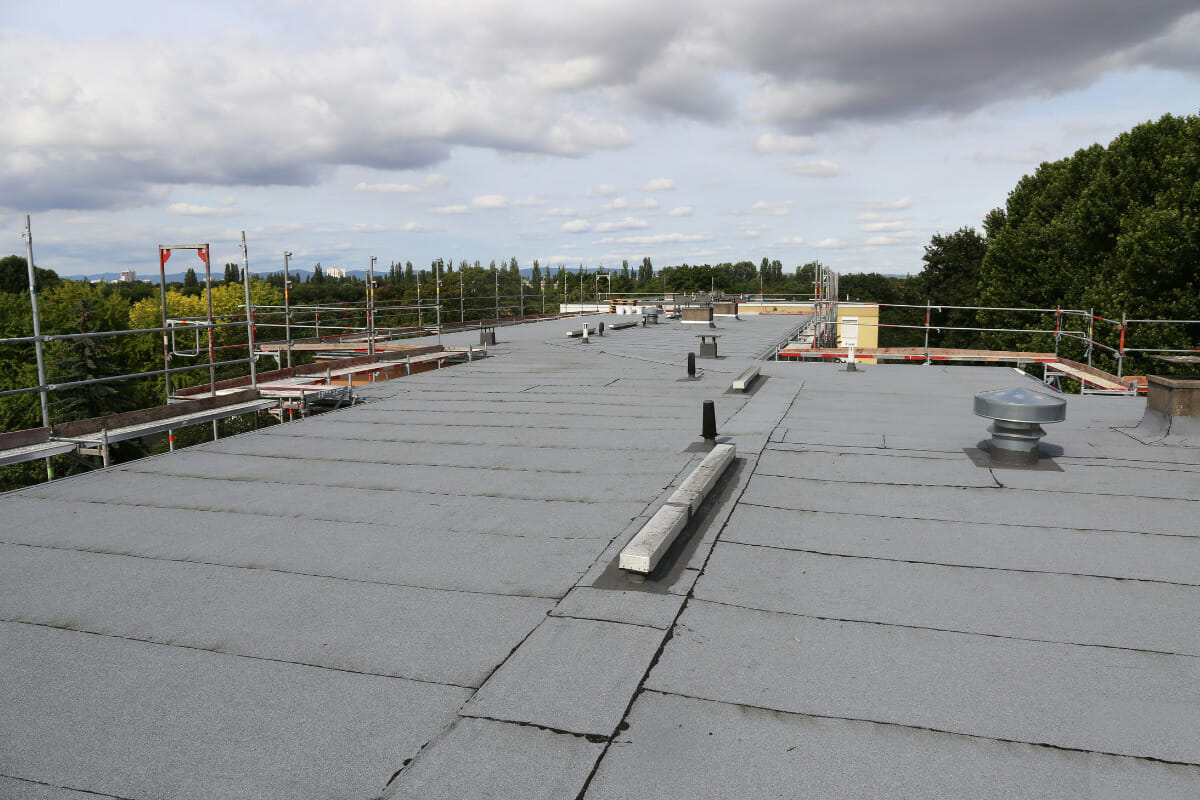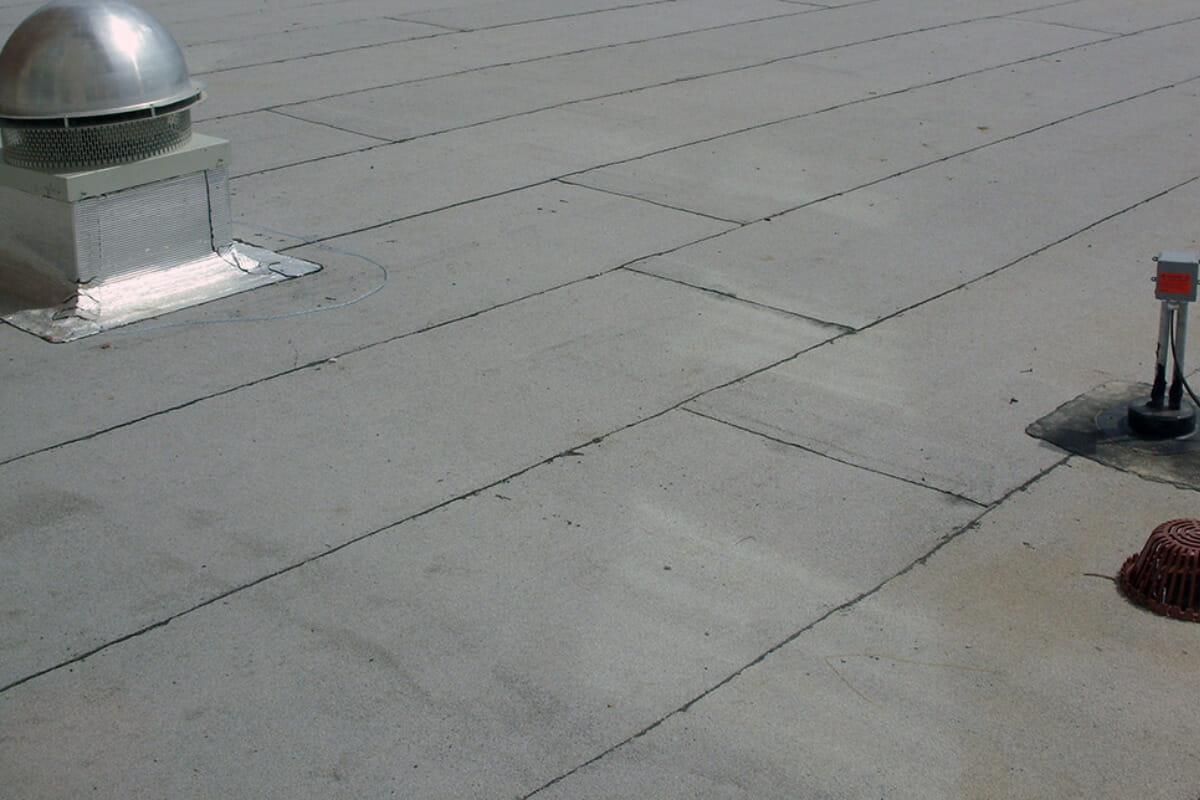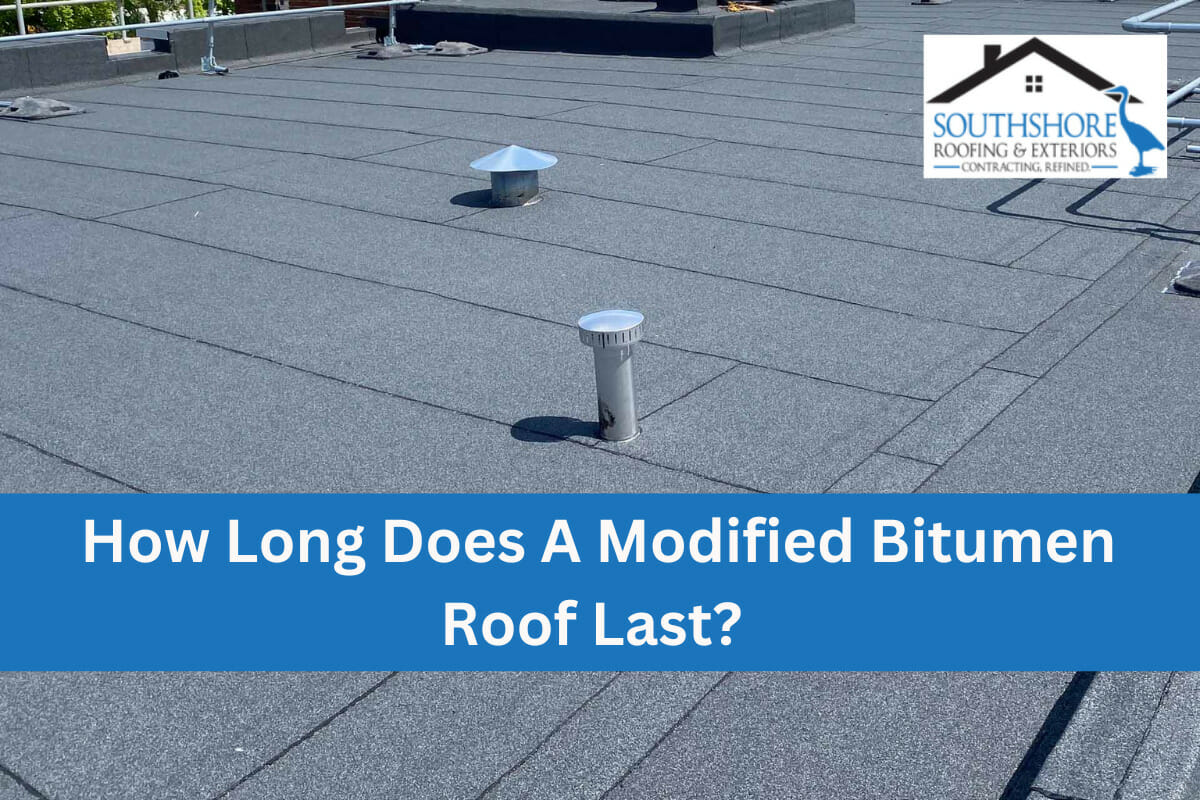When it comes to residential roofing, homeowners are often more aware of the types of roofing materials available to them. Options such as asphalt shingles, metal, or wood shakes are all highly popular.
But we haven’t seen the same type of awareness when it comes to flat, commercial roofs. One of the commercial roofing types that has gained popularity over the years is the modified bitumen roof. In this blog post, we’ll discuss modified bitumen, its lifespan, and more. So, let’s dive in and answer the burning question: how long does a modified bitumen roof last?
Before we do this, let’s start by talking a bit more about modified bitumen roofs.
What Is A Modified Bitumen Roof?
As a homeowner, you must have heard about asphalt shingles. These are one of the most popular roofing materials due to their affordability and versatility. However asphalt is a lightweight material that may not offer you the best durability, but luckily, there’s modified bitumen.
A modified bitumen roof is a type of roofing system that combines the durability of traditional asphalt with added performance-enhancing features. It is composed of layers that work in harmony to create a strong and resilient roofing solution.
The core layer consists of asphalt, which is modified with polymers to enhance its strength, elasticity, and resistance to factors like UV rays, extreme temperatures, and physical damage. This modified asphalt layer is reinforced with a base sheet, often made from materials like fiberglass or polyester, to provide additional stability. The surface is typically topped with granules that reflect sunlight and improve the roof’s overall look.

The Big Reveal: How Long Does It Last?
The lifespan of a well-installed and diligently maintained modified bitumen roof ranges between 20 to 30 years, providing decades of dependability. During its lifespan, this roofing system demonstrates resilience and steadfast protection against all types of weather and various environmental factors.
Types Of Modified Bitumen: APP and SBS
APP (atactic polypropylene) and SBS (styrene butadiene styrene) are two types of bitumen roofs. Both of these types of polymers enhance the roll and help it last longer.
APP-modified bitumen offers exceptional UV resistance and is particularly suited for regions with intense sunlight. It is heat-welded to the roof’s surface, ensuring a seamless and durable finish. On the other hand, SBS-modified bitumen excels in flexibility, making it an excellent choice for areas with significant temperature fluctuations. Its elasticity allows the roofing material to expand and contract without compromising its integrity.
Layered Protection: The Anatomy of a Modified Bitumen Roof
A modified bitumen roof is made up of multiple layers, each contributing to its longevity and performance. You will find that most of these roofs have at least two layers. Below is an in-depth look at each layer and its properties.
The Base Sheet
This is the foundation, the anchor that holds everything together. It’s typically made from fiberglass or polyester, adding strength and stability to the roof.
The Modified Bitumen Layer
Here’s where the magic happens. The modified bitumen layer consists of asphalt that’s been enhanced with polymers. These polymers boost the roof’s resistance to UV rays, extreme temperatures, and physical damage.
The Cap Sheet
Just like a stylish hat, the cap sheet tops off the roof. It can have granules for added protection and aesthetic appeal, helping it to reflect sunlight and keep your indoor space cooler.

Factors Affecting The Lifespan Of Modified Bitumen Roofs
In the section above, we covered that modified bitumen roofing can last for 20-25 years, but remember, a roof’s lifespan isn’t set in stone. There are certain factors that can affect its lifespan, compromising its durability and longevity.
Quality Of Installation
The first thing that plays a big role in how long a modified bitumen roof, or any other commercial flat roof will last, is how well it is installed. Just as solid groundwork is needed for a sturdy house, your roof needs a stable foundation. A professional installation sets the stage for a longer-lasting roof.
This is why we always advise property owners to avoid taking the DIY route and hire a professional roofing contractor that has the necessary experience for your project.
Climate Conditions
Just like people adapt to different weather, roofs also react to various climates. If you live in a place with strong sun, heavy rain, or freezing winters, your roof might wear out quicker. The tough weather conditions in these areas can speed up the aging process. It’s essential to keep this in mind so you can take extra precautions to protect your roof.
Maintenance
Similar to how we need regular medical check-ups, part of maintaining your roof is routine inspections. By identifying potential concerns such as cracks, tears, or areas exhibiting signs of wear, you can swiftly address these issues. Fixing minor problems as they arise can significantly contribute to the elongation of your roof’s lifespan, ensuring its continued optimal performance and extended longevity.
Foot Traffic
Modified bitumen roofs are quite durable and are known for being able to handle foot traffic better than other flat roofing options.
However, regular foot traffic on your modified bitumen roof, whether for maintenance or other purposes, can exert wear and tear that might curtail its lifespan. While your roof is designed to withstand the elements, it isn’t built for constant foot traffic. The weight of people, tools, and equipment can gradually compromise the integrity of the roofing material. When walking around the roof, consider utilizing designated pathways or placing protective measures down such as walkways or boards to distribute the weight and minimize direct impact.
Other Environmental Concerns
Overhanging tree branches can introduce a range of potential hazards. The shedding of leaves, branches, and sap may seem insignificant, but over time, they pile up on the roof’s surface. This accumulation can lead to moisture retention, creating an environment conducive to mold growth and deterioration of the roofing material.
Birds, rodents, and other critters often find rooftops appealing for nesting and perching but unfortunately, their presence can lead to damage. Nests and burrows created by these creatures can compromise the roofing material’s integrity.
By considering these factors, you can make smarter choices and take better care of your roof to make sure it lasts as long as possible.
Your Trusted Modified Bitumen Roof Installers In Tampa
Elevate your property’s protection with SouthShore Roofing & Exteriors, your dedicated partner for a top-tier modified bitumen roof installation in Tampa. As premier flat roof installers, we bring unparalleled expertise and precision to every project. Our tailored solutions, weather-resistant materials, and proven durability ensure a roofing investment that goes beyond expectations. Contact us today at (813) 400-3329 and take the first step in transforming your commercial roof.




